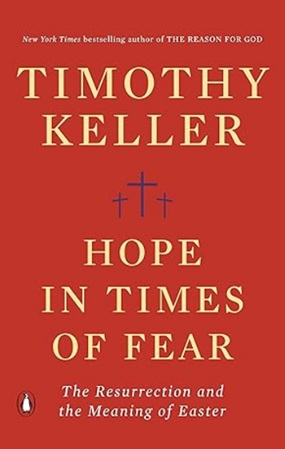In his book, Hope in Times of Fear: The Resurrection and the Meaning of Easter, Tim Keller makes this really interesting observation re: Peter’s violence at Jesus’ arrest and subsequently equally violent denial of his Lord, shortly thereafter.
It has an important implication for us, and not the one I’d immediately reach to.
Keller:
“Peter’s identity was based on the assumption of his superiority to his fellow disciples.
Peter told Jesus that he was the most passionate and faithful of all. He was not basing his identity on Jesus’s great love for him but on his great love for Jesus.
That meant that while Jesus was Peter’s teacher, Peter was being his own savior.”
Next, Keller links what Self-Righteous, Own Savior mode can do to us, drawing on Yale theologian Miroslav Volf’s theory of what led Cain to murder his own brother.
“Any identity based on our superior performance over other will produce at least two results — fragility and hostility.
First, there will be a deep insecurity and an inability to see yourself. Peter, despite Jesus’s direct warning to him about his coming failure, had no sense of danger. Why not?
Because if you base your very self-worth on being brave, and if you look into your heart and see cowardice, you will have to screen it out and deny it, or you won’t have a self left.
And that is true of any identity not rooted in Jesus’s unmerited love.
…. The second result is hostility toward those who are different.
If you get your identity from being the most passionate follower of Jesus, then you have to be angry or even violent toward someone who opposes your Lord. When Jesus was arrested, Peter was the only disciple who did violence…. when a false identity is endangered, the result is always hostility.”
That, of course, has implications for our lives – whether personal or interpersonal.
I struggle so much with the first aspect of identity – trying to be my own Savior – and absolutely find it so viscerally counterintuitive that God could love me, regardless of who I am or what I do.
That’s not how the world is structured.
That isn’t the way I see life or have experienced it since I was born. It was always a performance-based world, where you were applauded and worth something if you were “good” (however that’s defined) and treated as less valuable if you weren’t.
That’s just the way the sinful world operates.
The clear theological reality is that God doesn’t see us the way others do. We’re all equally sinners and Jesus taught, over and over, that the least is greatest and the point is there is no greatest, at all.
Human evaluation of what success is and isn’t, of who’s greatest or who’s not – it ain’t God’s.
Yet that rubric’s pushed on us from the moment we step into the world, and we never stop getting that message reinforced through every avenue, including ourselves.
So…. when it comes to the idea that God could actually love us because… he loves me? In spite of me? Despite me?
That’s what’s hard. And what I unconsciously try to rid myself of through performance to please and somehow be worthy of him.
I think (know) a ton of Christians struggle with this.
But that’s the self-saving identity Peter had, and it’s a religion of burden and absolute heresy by turning ourselves into our savior.
But it’s so easy to fall into that religion.
As to Keller’s second point — that a false identity will produce hostility — we see that all the time, today, at a macro level, too.
At a group level, Christians increasingly seem to be adopting an identity that’s kin to self-righteousness, and you can see the verbal violence that’s increasingly deployed in the political arena. I used to report and write on politics, and it’s no secret that things have now gotten so ugly and toxic. And Christians far too easily find themselves (whether on the right or left) reveling in the mire.
Instead of seeing the world as a mission field, we often see the world as a battleground between ourselves (“the saints”) and the evil ones who are trying to destroy it.
And we can dehumanize the exact ones Jesus worked so hard to humanize and say, “They’re just as valuable and I love them just as much”).
Keller:
“When we ‘other’ a group or people, we treat them as alien and strange, and we stress what we see as their weakness and evils in an effort to prove to ourselves and others how superior we are by contrast.”
In a wonderful Good Friday address from 1982, Raniero Cantalamessa reminds us that we must all continually embrace the confession “I killed Jesus of Nazareth.”
Not to beat ourselves up.
But to remind us, individually, that we can’t be our own savior, and, collectively, that we dare not judge the others who put the Lord on the cross.
We are all equally responsible, we all spit on and rejected him, and for any of us to put ourselves in judgment of another is to put ourselves on God’s throne. Which is blasphemy.
And, again, at a micro level, to sit in a place of working ourselves to salvation, we are also putting ourselves in the place of Christ.
I will struggle on fighting these unconscious identities and their manifestations for as long as I live.
The only answer is Christ, and even if you and I fail in our fights, we always have to remember that Christ’s salvation is enough.
If our salvation depended on the merit of our own faith, then God help us. None of us would be saved!
But Jesus’ mercy and grace is stronger than anything our sin could throw at him. Thanks be to God.

